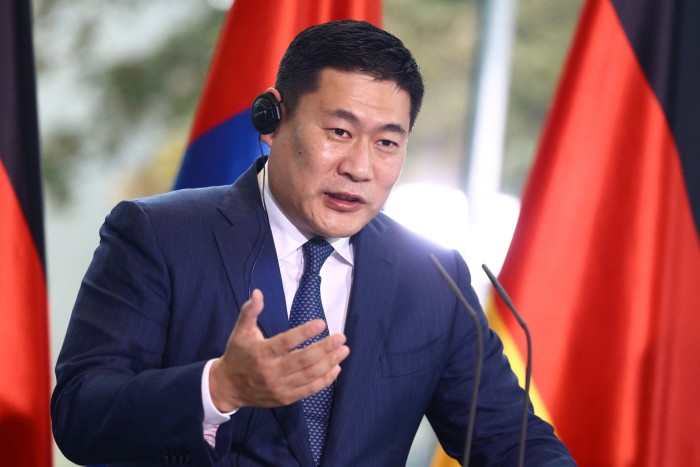[ad_1]
Russia’s full-scale invasion of Ukraine has hurt the Mongolian economy, its prime minister has said, claiming financial damage including the loss of airline revenues and difficulty in importing necessary supplies from Russia.
Almost a year on from the full-scale invasion of Ukraine and the subsequent imposition of wide-ranging sanctions by the US and its allies on Moscow, the landlocked democracy of just 3.3mn people sandwiched between Russia and China is still reeling from the impact.
“Even though Mongolia is a democratic country it is also under pressure because of the sanctions imposed on Russia,” Luvsannamsrai Oyun-Erdene, the country’s 42-year-old prime minister, told the Financial Times in an interview. He added that the punitive measures amounted to “a double sanction on Mongolia even though it is not our fault”.
The collateral damage ranges from complications in paying Russian companies on which Oyun-Erdene says Mongolia is “wholly dependent” for fuel, to the loss of revenues from airlines that once flew over the country.
“The situation in Ukraine is not just a conflict between two countries,” the prime minister said. “It is having a negative and huge impact on the world economy and especially on small and landlocked countries including Mongolia . . . Economic sanctions have to be imposed based on extensive research because they’re having extensive impacts and negative influences on other countries.”
Airlines that once operated Europe-Asia routes through Russian airspace also flew over Mongolian territory, for which they paid Ulan Bator valuable “navigation fees”. Those have dissipated as Russian airspace bans — implemented by Moscow in retaliation for EU measures targeting Russian planes — have forced many European airlines to fly either over the North Pole or take a more southerly route across Central Asia and Turkey.

“Because aeroplanes cannot go over Russia we are lacking our navigation revenues,” Oyun-Erdene said. “Second, we import our fuel from Russia and as [Russian energy] companies and banks are under sanctions, we are facing payment issues.” He added that war-related shortages in Russia for commodities such as diesel fuel, sunflower oil and mining equipment had led to “disruption of some products we use on a daily basis”.
Oyun-Erdene has highlighted these issues during a flurry of diplomacy over recent months, including a trip to Germany in October and an August visit to Ulan Bator by UN secretary-general António Guterres.
Wang Yi, China’s then-foreign minister, also travelled to Mongolia late last year shortly after being promoted to the Chinese Communist party’s politburo.
“We do believe that China, the EU and Germany have a great influence on [the Ukraine] situation,” Oyun-Erdene said. “In this context I paid an official visit to Germany and also we had discussions with our Chinese counterparts, in particular during Wang Yi’s visit to Mongolia.”
Mirroring its dependence on Russia for critical supplies, Mongolia is equally reliant on Chinese demand for its coal, copper and other commodity exports. Coal and copper account for about 60 per cent of the country’s total exports, followed by gold and iron ores at 20 per cent.
In late November Oyun-Erdene presided over the opening of a new cross-border rail link into China that his government hopes will increase pre-pandemic coal exports of about 30mn tonnes per annum to as much as 80mn annually.
“Ninety per cent of Mongolia’s exports go to China and Mongolia is wholly dependent on Russia in terms of fuel. We’re also dependent on our two neighbours for food and other products,” the prime minister said. “But Mongolia is a parliamentary democracy and [our] people’s mindset and society is very different from those countries . . . Mongolia is landlocked, but we’re not mind-locked.”
This democratic mindset can fuel popular pressure on Mongolian leaders that their counterparts in China and Russia rarely have to contend with. In early December large crowds, angry at the alleged theft of state-owned coal assets, threatened to storm government buildings in Ulan Bator.
“The frustration and mass protests were a result of uneven wealth distribution that has taken place over the past 32 years,” Nyambaatar Khishigee, justice and home affairs minister, said in a separate interview with the FT, referring to the period since Mongolia’s transition to democracy in 1990.
Oyun-Erdene’s administration has since launched wide-ranging investigations into government officials and executives at state-owned natural resource and transportation companies.
The government has arrested dozens of people for alleged bribery, abuse of power and “unjust enrichment”, including police seizure of 7.3bn tugriks ($2.1mn) from the home of a state railway executive.
But the government is challenging protesters’ allegations that as much as 40tn tugriks worth of state coal reserves have been stolen since 1995 — compared with official earnings of 45.2tn tugriks from coal exports over that period.
[ad_2]
Source link
